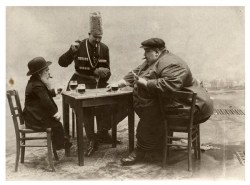Monthly Archives: January 2016
I didn’t intend to shoot two music video posts today, but given the givens, I can’t not put up this one. Especially since, after having been taken offline, it’s apparently back:
Madonna’s video for Take a Bow is one of the all-time greats:
It puts a cool spin on the story of the song. It’s sensual without being pornographic (walking the line, anyway). A more obvious take might have been Madonna as Marilyn Monroe to a politician or somesuch. Which makes this more creative and memorable.
There was a follow-up to the video featuring the same bullfighter (Emilio Munoz):
Not quite as good, but still a good companion with the first. I’m not sure about Munoz’s acting abilities, but his wooden manner worked really well for this particular part.
 Pascal-Emmanuel Gobry looks at a study on the damage academia’s liberal bias is doing to the social sciences. It’s a problem without a great solution, except trying to change the discrimination mentality where it exists… but that’s harder to do now that the notion that truth “has a liberal bias” mentality has taken hold.
Pascal-Emmanuel Gobry looks at a study on the damage academia’s liberal bias is doing to the social sciences. It’s a problem without a great solution, except trying to change the discrimination mentality where it exists… but that’s harder to do now that the notion that truth “has a liberal bias” mentality has taken hold.
If not for your own sake, don’t smoke for the sake of your pets. Or something.
Good news! The UN is cool with keeping the Internet free… for another ten years. The globalization of Internet governance is just going to be terrific.
There may be a link between droughts and civil war, but according to the Royal Economic Society the evidence is that it’s a weak link.
Microsoft is getting into the pre-crime prevention business.
Randomized drug tests bad. Fraternities bad. What’s a good ole boy to think?
Getting kids to learn is hard. Making sure they show up, though, is less hard. So let’s measure that. I wrote of gameable metrics in 2011.
Well, that’s one way for private schools to recruit students in a rough market.
Women in Brazil are being warned not to have children, due to an outbreak of the Zika virus.
President Edrogan literally talked a man off the ledge. Well, it was a bridge, but still. That’s cooler than the whole speaking well of Hitler thing.
Joseph Lenoff writes of his experience as an American Jew in the Israeli military.
A wedding amid ruin.
Meet Alabama’s version of Marion Berry, convicted of stealing from the city but re-elected anyway. The local HBCU had a problem with a university president who was basically stealing money, made more complicated by the fact that she was the best university president they’d had in a long time and arguably saved the university from ruin.
The star-crossed love story between an inmate and a guard in Louisiana… kind of made socially safer by the fact that the inmate was male, I guess, and that we can blame for profit prisons or something.
An entire police department in Florida was arrested for money laundering.
You may have seen the meme.

My friend, Jim Babka, of Downsize DC and a gun owner and strong gun rights supporter commented on Facebook that he wished memes came with sources. This is a meme I’m sure he’d like to be true, but he’s expressing his doubt. And with good reason, as I’ll show.
Two caveats before I begin. First, since the meme does not say whether it’s talking about murder rates or total murders, I’ll report both. But murder rate is the only number that really matters. China, with almost 1.4 billion people, could have 100,000 murders per year and have a murder rate of 7.1 per 100,000 people, while Iceland, with 323,000 people, could have just 100 murders per year and have a far higher rate at 31 per 100,000 people. Comparing total murders doesn’t tell you as much about how dangerous a country is as its murder rate.
Second, the data I’m using comes from multiple years and multiple sources, so my conclusions are false in their apparent precision. But more unified data could not plausibly be different enough to change the general conclusion. So here goes.
The United Nations Office on Drugs and Crime (UNODC), as reported by Wikipedia, lists the U.S. as 121st worst in “intentional homicide” rate, at 3.8 per 100,000 population, and 12th worst in total murders, at 12,253 (data from 2013). The data come, variously, from years between 2009 and 2013 inclusive, so for any given year that might go up or down a little bit.
The FBI’s 2014 crime report claims a murder rate of 4.5/100,000, which would put the U.S. at 113th in the UN ranking, and total murders at 14,294, which would put the U.S. at 9th in total murders, both slightly worse than the UNODC rankings.
But whichever data set we use, the U.S. is not 3rd in murders as the meme claims. Strike one.
Now about those cities. They’re strange choices because they’re not the top 4 in total murders in the U.S., which, using the FBI report’s city-level data on “Murder and nonnegligent manslaughter” (which will be a slightly higher number than just murder), would be 1) Chicago, 2) New York, 3) Detroit and 4) Los Angeles. Instead of NYC and LA the meme substitute 9) New Orleans and 15) Washington. Odd, but ok, since it actually makes the meme’s estimate more conservative, by excluding fewer murders. So it’s not that they’re cherry-picking, it’s just that it’s more evidence the meme is just made up by someone not looking at any real data.
Now we can subtracting Chicago’s 411 “murders and nonnegligent homicides, Detroit’s 298, New Orleans’ 150, and Washington’s 105 (all from the FBI report) from the national total of murders we’re left with 13,330 total murders in the U.S. Note that “murders and non-negligent homicides” is a greater number than just murders, so if we’re just interested in murders–the term the meme uses (although I doubt they were trying to be precise in their legal terminology)–we’re subtracting extra non-murder deaths from the total murder rate, overstating the effect of removing those cities from the national murder count, which works in the meme’s favor. And yet 13,330 murders nationally would only drop the U.S. from 9th on the UNODC list(using the FBI’s data) to 11th, still above the UNODC’s ranking of the US at 12th.
But what about the more important murder rate? The U.S. population minus the population of those four cities is 314,842,406. Dividing the 13,330 murders in the rump U.S. by that population, gives a murder rate of 4.2/100,000, or tied for 115th (with Cuba and Tuvalu). Working up from the countries with the lowest murder rate, eliminating those four cities’ murder rates would put the U.S. 103rd from the bottom. Maybe they just kept the 3 and dropped the 100? Strike two.
In short, eliminating those four cities does improve the U.S.’s world ranking in homicide, but not by much.
Both in passing and in conclusion I’ll note that the girl in the picture appears to have both fingers in the trigger guard. Strike three.
Expecting a lot of hassle on the flight down to Deltona and back, we decided to take the unusual step of getting a leash for our child. There is a picture to the right, but even without it you can imagine what it is. I can’t remember whether Clancy brought it up first or I did, but when it was brought up the other person was already thinking about it. It made a lot of sense to do it this particular trip since I would be coming home with the little one separately from her.
From the get-go, our entire attitude towards it has been different. Though we both thought it was a good idea, she was very worried about judgmental strangers from the outset while I wasn’t worried about it at all. Some of my lack of worry is “Why would anybody object?” Here is an example:
What kind of people have we turned into the put our children in leashes? I mean…that’s like treating them no better than your dogs!! I don’t care how restless and uncontrolable they might get.
There’s a thing called a stroller! Or even better…don’ take them out. That way…they learn. They think ‘oh wow…when i act up i don’t get to go out and have fun. Let me behave so I don’t get strapped into the stroller or taken home.
And that, boys and girls, is called parenting.
But it mostly seems like a non-issue, for the most part. Most of the people responding to that little lecture said they approved of the leash. The author of this pro-harness piece said that she gets looks of disapproval, but most of the responses in the comment section are supportive.
Here’s an article:
For the general population of kids, a firm stance as a parent should be enough to keep a child from scooting off, said Susan Newman, a New York social psychologist and parenting expert who is a critic of the harnesses.
“To me, it’s like treating a child like a dog or an animal when in fact as a parent your job is to make the rules,” Newman said.
“The perception is, this is a parent who can’t control her toddler.”
Yeah, well, I can’t. At least not with 100% reliability. The vast majority of the time I can let her down and if I want to go somewhere she will take my hand when I ask her to. And that’s all good and fine. However, the airport isn’t a great place to test that theory. Nor is hanging around busy traffic. Because, you know, the one time you lose track of them…
It’s… a no-brainer, at least in some circumstances like a busy airport or walking around the street. Lain objected at first, but took to it pretty well when she realized that meant that she was more likely to be able to walk around (at least within a radius). And it’s so imminently practical on what basis is there really room for objection? Especially when dealing with a three year old or anyone at the age where it is something that they still have to learn. And, of course, if there were glaring eyes, I could care less.
That’s where gender plays a bit of a role. As a father, far less is expected of me. In fact, if someone did look disapprovingly at me at the airport, they were as likely to think my wife is negligent (for not being the one taking care of the little one) than I am.
There is also the more general way that Clancy and I look at the world differently. She expects a degree of confrontation with the world than I do. So an ambiguous response is more likely to be assumed as negative by her while positive by myself. And I’m probably less likely to notice other parents looking anyway. I didn’t notice any furrowed brows at all. There were a couple of people who thought it was funny. The lady behind the counter at the gate desk said she wishes those things had been around when her kids were little because they were always darting out in the middle of nowhere.
On the flight back, Lain mostly took to walking right behind me and holding on to the wheel of her stroller, which was over my shoulder. Which was fine except that she was in my blind spot, and periodically she would decide she wanted to sit down.
But no disapproving stairs noticed. And if any were missed, screw’em. This is the future, people.
There is something especially annoying about timing the release of a shoddy study111 to convince people not to try ecigarettes as their New Years Resolution.
Who needs to make arguments when you can just correlate the opposing position with racism. I mean, you don’t want to side with racists, do you? Do you?! I mean that just settles it.
Cory Doctorow presents a list of works that copyright term extensions prevented from entering the public domain this year, while Eric Compton looks at at the effect of availability on Amazon of works before and after the copyright cutoff.
This… actually seems reasonable from a legal perspective, but also indicative of not being able to have nice things.
Melanie Trottman looks at whether or not boosting the minimum wage decreases reliance on government assistance.
I can always get behind labor victories that involve companies not paying their employees for the time they demand.
Oil export ban lifted! Let the shipping begin!
In looking at the “reality distortion field” in Elizabeth Holmes and her troubled tech startup Thanatos, Uncle Steve looks at prolific board members and what information we can derive from it.
I can sort of understand what this guy is getting at, but I think the point would be better made on a more attractive website, and perhaps he could draw some revenue with some ads. {via Vikram}
Priceonomics asks if checked baggage fees are too low. Gary Leff says no.
British gun museums may have to disable their guns because EU and because terrorism.
This sounds weird and intriguing. A Ukraining pokes in the ashes of Chernobyl to try to confirm an age-old conspiracy theory.
Wasn’t there an Eddie Murphy movie about this?
Erica Grieder explains how Texas Republicans could help deprive Donald Trump (if he wins the nomination) the presidency.
The Obama Administration inadvertently called Puerto Rico a colony, and Puerto Ricans are not pleased. I am, broadly speaking, fine with Puerto Rico’s territory status, and they seem to be, too, but it does represent certain complications.
It’s something of a controversial topic, but I pretty much understand why college football coaches are paid what they are, as they coach athletes who are not paid money. I think it would be better for college football if it were limited in some way, but the big fish don’t want that and they get what they want. And so teams outbid one another for the best and most desirable coaches, and that makes complete sense to me.
Where I do find myself baffled, though, is when schools seem to pay coaches a lot of money because… well, for no reason that I can discern. Tennessee’s coach Butch Jones, for example, is a part of the four million dollar club. Jones isn’t a bad coach, but it wasn’t like anyone else was beating down their door to hire him. Nor did it especially look like he was thinking of retiring or taking some time off and so they had to pay him more to keep him going. Nor does it seem likely that they would not be able to replace him if he did go. But they paid him the money… just because, as near as I can tell.
Another example is in South Carolina. South Carolina had reached an arrangement with Arizona coach Rich Rodriguez that was quite generous. But Rodriguez had a job where he seemed reasonably satisfied that paid him well. He had been fielding other offers. He failed at Michigan, but succeeded at both West Virginia and Arizona. He was something of a hot commodity. Three million dollars doesn’t seem out of line. At the last minute, though, Rodriguez decided that he wanted to stay in Tucson. Hey, it happens. South Carolina immediately hired Auburn defensive coordinator and former Florida coach Will Muschamp.
What really surprises me is that they offered him the exact same deal they’d offered to Rodriguez. Unlike Rodriguez, Muschamp did not have a sitting head coaching job that he needed to be pried away from. Nor had he been mentioned for other openings. He did not succeed at the only head coaching job he’s ever had. That doesn’t necessarily mean that he is a bad choice, but it does seem to me that giving him the opportunity at another chance at being a head coach in the SEC is a form of compensation in and of itself. They’re taking a chance on him in a way that they weren’t with Rodriguez. There is no real reason that they should be paid the same. The three million dollars paid for, in part, the idea that Rodriguez was a reasonably safe hire (as far as such hires go).
Southern Tech did this as well, a hire or two back. It was an internal hire, which is fine. It was someone that hadn’t really been on anybody’s radar, though, which was questionable. But one of the thoughts I had when we hired him was “Well, at least we should be able to get by paying him less so that he can hire better assistants. Nope! We paid him about 10% less than the successful outgoing coach. He ended up hiring assistants on the cheap, and we got what we paid for.
Olivia Legaspi, a student at Haverford, writes about what working at McDonald’s has taught her about privilege [hat tip: Rod Dreher]. Legaspi, who suffers from PTSD but needs to work to fund her college education, notes that while at Haverford, she and her fellow students are encouraged to “to ask for help when we feel we need it, speak up when we feel uncomfortable, and prioritize our own well being over most other things,” at McDonald’s, she has to put others first and doesn’t have recourse to those strategies. On balance, she says, this was a good thing:
Before you encourage someone to practice “self care” in its current definition, think about in what situations this is actually useful or feasible advice….I’m grateful to have worked at McDonald’s: It taught me how better to handle my anxiety and how to put myself last in the name of efficiency and a common goal. McDonald’s strengthened my character, my work ethic, and expanded my capacity for resilience, valuable lessons which could not be learned in the “safe spaces” of Haverford’s campus. We must remember that putting oneself first is the essence of privilege, and that, in order to grow, we must leave this selfish mindset behind.
I’m temperamentally disposed to agree with her. Working customer service jobs can be a valuable part of anyone’s upbringing. If Legaspi had focused the unfairness of her situation, I would likely be writing a post about how she overlooked the positive aspects of working. So while I’m about to disagree with her, I do so in the spirit of supplementing, not negating, what she’s saying.
My disagreement: We should beware overlearning those lessons. While “putting oneself first”–or more accurately, being in the position to do so–“is the essence of privilege,” it’s sometimes necessary. My ability to go to the dentist and afford the visit is also part of my privilege. But I’m not going to abstain from those visits because others cannot enjoy the same treatment. (And to be clear, Legaspi is not saying I should. She is saying, in part, that recovery, survival, and self-care involve interacting with the real world, and that world is not going to out of its way to accommodate her needs.)
Service work doesn’t always expand one’s “capacity for resilience.” It can sometimes be degrading. Legaspi doesn’t deny that, but sometimes the solution to degrading circumstances isn’t always putting the customer (or whoever) first. Sometimes it involves engaging in the resistance necessary to keep one’s dignity in the workplace, or at least make the job more survivable. Legaspi doesn’t tell us whether or how she may have “resisted,” and I probably am too eager to see “resistance” where it isn’t, or to say it should be resorted to when it needn’t. (For some labor historians, an employee going on a bathroom break can count as “resistance to dominant structures of exploitation.”)
Still, Legaspi’s lessons need to be balanced against what a lifetime of such labor might entail. As Megan McArdle said in a different but relevant context,
I’m thinking it’s a lot harder to get out of bed on Monday in year 13 of your stint as a janitor than it was on day 300–and that it’s harder to get out of bed on Day 300 if you know there’s probably going to be a Year 13.
I’ll repeat that overall I agree with Legaspi. I am trying only to warn against the uses to which it’s possible to take her argument. I’ll close with the words of one person who commented to her column and with which I agree:
I’ve also worked unpleasant jobs: some of them early in my career when I didn’t have a choice, and had to stick them out; some of them much further along in my career, when I had the resources to wish my unpleasant boss well and quit. I wish those sorts of jobs didn’t need to exist. I wish nobody ever had to shut up and smile and take it, from an unreasonable boss or customer. But allowing the difficulties you encounter to shape and form you in virtue and discipline is a great thing. And having the wisdom to understand that this is what’s happening is even better. Well done.
Well, it’s finally happened. My daughter became a princess:
While we were down in Colosse, we visited my friend Kevin and his family, which includes two daughters and a son. While we talked the night away, they kind of swept Lain away and started playing dressup.
Which was pretty awesome. It was one of those things that provided the sort of experience that Boring Mom and Dad never give her. We don’t really do dresses, for the most part. We’ve had them, it just never occurs to me to actually put her in them. Even her Halloween costume consisted of a skeleton outfit.
But it was mostly awesome because Lain had some kids to play with and had an absolute blast. How Clancy and I ended up with a child that is so social is only slightly less a mystery than how we ended up with one who is shorter-than-average. It was really amazing to watch her play with other kids. The only downside is that we feel like we’re shortchanging her by not having more local friends with kids for her to play with. (Also short-changing ourselves, but that stings less.)
 A cool collection of prints showing how the Japanese saw western inventors, artists, and scholars.
A cool collection of prints showing how the Japanese saw western inventors, artists, and scholars.
Elizabeth Wright explains how Marcus Garvey should be honored as an enemy of Communism.
Lymon Stone looked at the demographic history of slavery in the United States.
Jose Duarte writes of the importance of debunking.
Well, this is the stuff of childhood nightmares (and eco-friendly children’s movies).
Tiffany Brodesser-Akner looks at Cool Jesus, faith for Millenials and the cool set.
“We’re melting the candy bars they want nothing to do with and selling it back to them.”
For Sale: A Town in South Dakota. It’s a couple hours outside of Rapid City, which makes it less convenient than the town in Wyoming that was sold in 2012, though not as isolated as the one sold in Wyoming last year.
This is pretty awesome. Obviously, all we see is a part of the face and some of the most difficult stuff CG is the hair. But… cool all the same.
iPhones are being dumbed down, and for once, and for once it’s not Apple’s fault. It’s the FDA’s.The death of Americans’ love affair with cars has been greatly exaggerated.
If you’re not careful, your otherwise helpful car may drop the dime on you.
Microcondos are coming to Houston.



